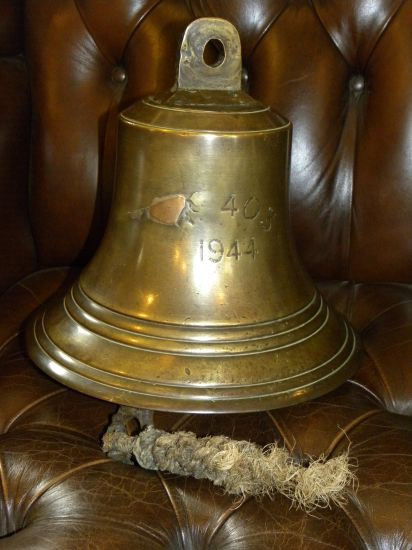 ONE of the last remaining bells from a D-Day landing craft has been discovered after being lost for nearly 70 years.
ONE of the last remaining bells from a D-Day landing craft has been discovered after being lost for nearly 70 years. The bell, which even has a bullet dent from the assault on Omaha Beach, is now being sold by Hemswell Antiques Centre after it was discovered in a scrap dealer’s yard.
Now the story of the bell and the boat it graced is attracting interest from historians and ex-service groups in the US.
The bell is inscribed with the name of the landing craft it graced – the LCI(L) 403 – and though the story of the boat’s heroics in the war is partly documented its journey for the last 65 years is a mystery.
The LCI(L) 403 was built by the George Lawley & Sons Shipbuilding Corporation in Neponset, Massachusetts in the mid-1940s.
From the US it sailed to Portsmouth in March 1944 as part of a convoy of 500 ships.
Just two months later the 403 was part of the D-Day landing force that stormed the enemy at Omaha Beach on June 6.
During the assault on the beach the stormy and crowded sea forced the 403 to crash into a fellow landing craft and it lost its port ramp. Despite the setback the craft managed to collect 32 wounded soldiers and ferry them safely from the front line.
After 15 months service in Europe the boat returned to the States and was refitted as a gun boat in Boston. But the war ended soon after and the boat did not see active service again.
What happened to the boat and its bell is not known until this year when it turned up in Yorkshire and was spotted by a militaria dealer from Hemswell Antique Centres.
Since this article was written, this bell has now been sold.
“Bells from LCI’s are, I believe, quite rare. Not all had them,” said John Cummer, president of the USS LCI National Association in the US.
One of the few remaining bells of this kind belongs to the Amphibious Forces Memorial Museum In Portland, Oregon and is used in memorial services and annual reunions.
The museum is now restoring an landing craft to preserve the history of the Amphibious Forces in WWII, Korea, and Vietnam, and to educate the public on the rich naval maritime heritage that the Amphibious Forces have played in US history.
“It is an item we would love to have in our Museum,” said museum board member Gordon Smith, who served for five engagements himself on LCI 43.
“Some LCI's did have a small bell and to have one with the ship's number engraved on it is so unusual it makes me think that the Captain may have had the bell or at least the numbering fabricated for him.”
Owner of Hemswell Antique Centres Robert Miller said: “The bell is a typical example of the kind of amazing items that are in every corner of the centre. Each item is a piece of history with its own amazing story or mystery.”